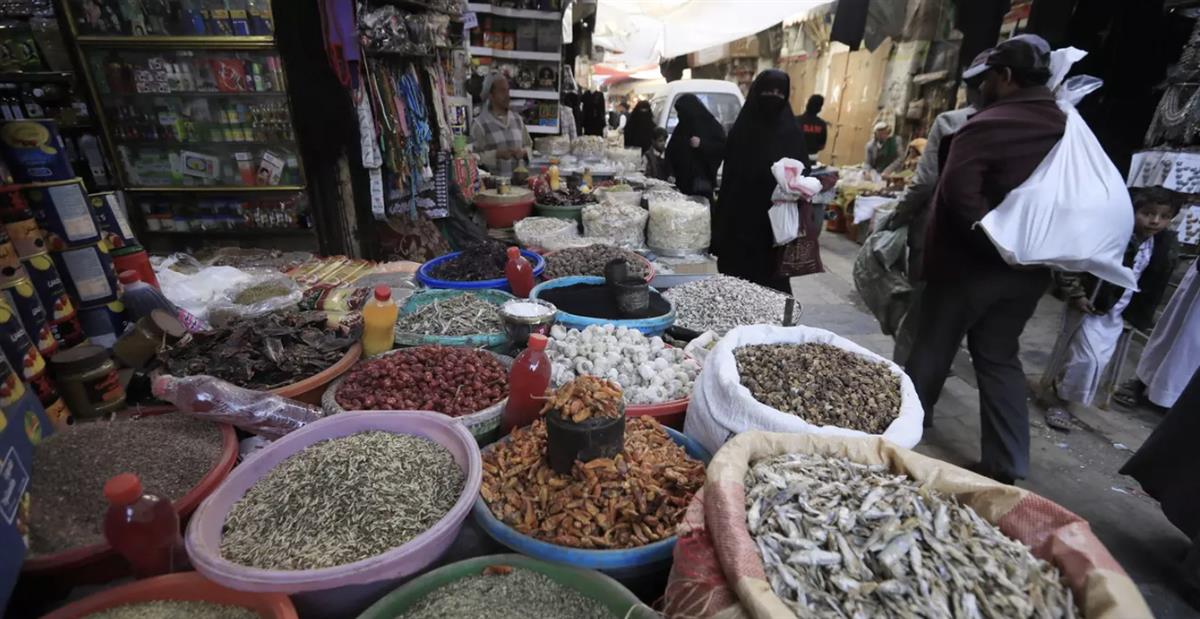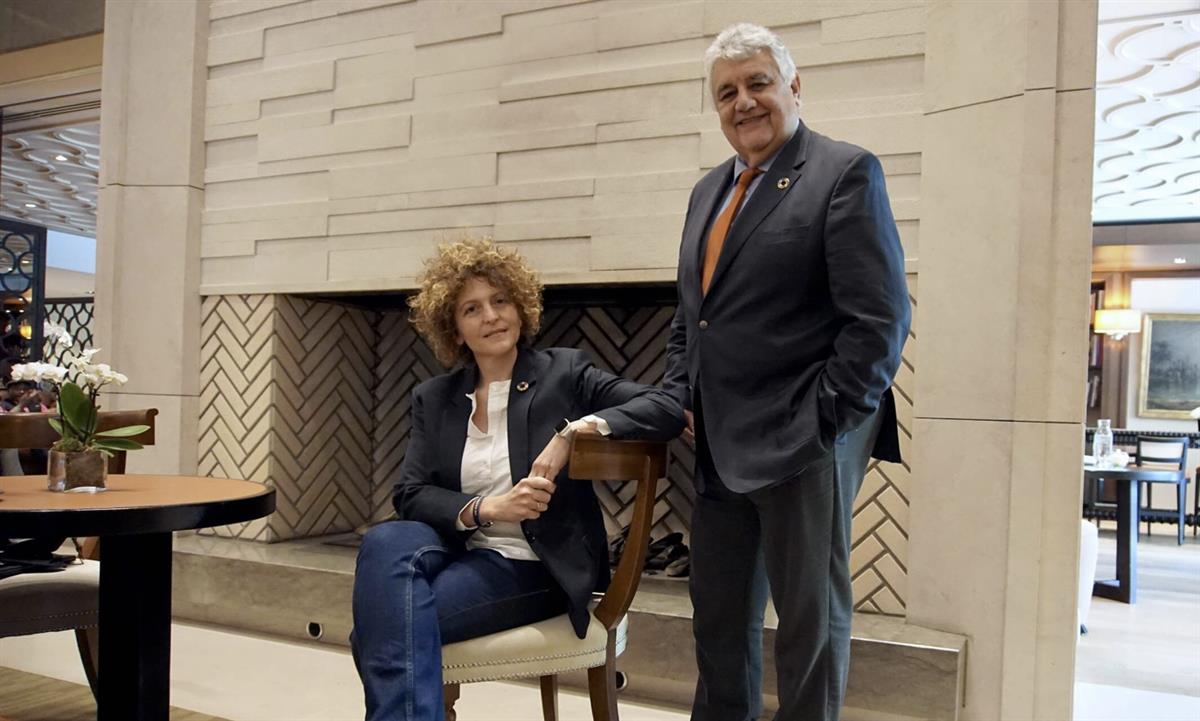 A market in Sana'a, Yemen, 2 March 2024. The escalation of Houthi attacks on shipping lanes since last year is expected to disrupt the country’s food imports between March and April 2024, leading to food shortages in the markets, according to the FAO. (Keystone/EPA/Yahya Arhab)
A market in Sana'a, Yemen, 2 March 2024. The escalation of Houthi attacks on shipping lanes since last year is expected to disrupt the country’s food imports between March and April 2024, leading to food shortages in the markets, according to the FAO. (Keystone/EPA/Yahya Arhab)
SOURCE: GENEVA SOLUTIONS
KOFI ANAN COMMISSION OF FOOD SECURITY
Food security Kofi Annan Foundation
Between millions of people going to bed hungry every day and growing pressure on the planet from resource-intensive food production and consumption, the global food governance system is failing to live up to the task. A group of experts that met in Geneva this week is trying to find a better way.
If you could rewind the tape to 1945 and the early years of our modern multilateral system, how would you build the global food governance architecture so that no one ever goes hungry? That’s the question a group of experts set up by the Kofi Annan Foundation will grapple with for the next six months.
The Food Security Commission and its eight prominent figures including former Ethiopian prime minister Hailemariam Dessalegn Bosheormer, ex-chief scientist at the World Health Organization Soumya Swaminathan, president of the Alliance for a Green Revolution in Africa Agnes Kalibata and David Nabarro, former co-lead of the UN Global Crisis Response Group on food-energy-finance, have the ambitious task of figuring out what’s wrong with a system that is largely failing millions of people who are lacking sufficient and nutritious meals day after day.
“Governments in both high-income countries and low- and middle-income countries have made commitments to address food insecurity and poor diets in numerous settings since the SDGs were announced. Some have called on the private sector to invest in transforming food systems while others have asked development banks to align financial incentives with food system-related goals,” Corinne Momal-Vanian, executive director of the Kofi Annan Foundation, told Geneva Solutions. “Ultimately, progress has not met urgent needs.”
The one-year project, announced in December with around $1 million in funding from the Rockefeller Foundation, aims to produce a report to be ready by the UN General Assembly in September. The blueprint will contain recommendations for governments and other key actors on how to deliver the SDG 2 promise of ridding the world of hunger by 2030 – though convincing them to implement them will be a challenge in itself.
No reinventing the wheel
The commission met for the first time in Geneva this week to create a programme of work. Amir Abdulla, former deputy executive director of the World Food Programme, who is also part of it, is optimistic but also apprehensive. “There's so much ground to cover,” he told Geneva Solutions after wrapping up the two-day intensive brainstorming session.
Climate change, conflict and the economic shocks from the Covid-19 pandemic and the Ukraine war, among other factors, have pushed millions into food insecurity while small-holder farmers struggle to earn enough to feed themselves and their families. The Food and Agriculture Organization (FAO) estimates that between 691 and 783 million people went hungry in 2022, while 2.4 billion people were moderately or severely food insecure – that’s nearly one third of the global population. Projections for the coming years paint an even bleaker picture, and fragile economies stand to bear the brunt.
This is despite the billions of dollars poured into food aid through the World Food Programme and other humanitarian groups or agricultural policy support through the FAO, the World Bank and others. The UN’s and its members’ perceived inability to face the hunger crisis has also invited harsh criticism.
“Voices from civil society and the Global South speak of insufficient representation, inclusiveness, accountability, and transparency,” said Momal-Vanian. “Others express concern at perceived duplications, inefficiencies, and institutional complexities, and wonder whether current global governance mechanisms set up in the aftermath of WWII, including those related to food, nutrition and agriculture, remain fit for purpose.”
For Abdulla, the UN and others have delivered great improvements, but the challenges are becoming too complex for them to face them as they are. “This is not about reinventing the wheel or going back to ground zero. There are so many mechanisms, whether governance or coordination structures, that it’s a matter of finding a way to connect them better,” he said. “How do we get them to fit together better so people don't fall through the cracks?”
Systemic solutions needed
The longstanding challenge of getting all actors to work together is one that commission member Sara Roversi also identifies. She is the president and founder of the Future Food Institute, an Italian-based organisation that does research and training in areas such as regenerative farming, waste management and other stages of the food production process and that partners with the FAO.
“Issues like food security, at the global level, have always been approached from a silo perspective, thinking that we need to just rely on the organisations addressing food and agriculture. But this is a complex issue that needs systemic solutions,” she said.
To that end, climate change, biodiversity, human health, and other aspects, according to Roversi, also need to be addressed. Hunger more than doubled in 2022 in climate hotspots as floods, droughts and other extreme weather events ravaged crops and other means of subsistence, according to Oxfam.
For Roversi, all actors, including industry and consumers, have a role to play in that radical change. The commission plans to speak to as many actors as possible to gather insights in some form, for example by organising dialogues or workshops, she said.

Sara Roversi and Amir Abdulla, members of the Kofi Annan Foundation's Food Security Commission, at the InterContinental hotel in Geneva, 15 April 2024. (Geneva Solutions/Michelle Langrand)
Governments run the show
In rethinking the global food system, the commission has taken on an ambitious task. However, convincing governments and others to implement their ideas will be even more challenging. The experts have already begun discussions with major aid organisations, including the International Federation of Red Cross and Red Crescent Societies, the International Committee of the Red Cross, and diplomats from key countries such as Brazil and Italy, which hold the G20 and G7 presidencies this year.
“Because it is member-state governed, the UN finds it has to conform to certain parameters. That means it can't always do what needs to be done,” said Abdulla.
That is especially true in conflict-struck places where, above all, political forces are depriving people of food, such as in Gaza and Sudan – both of which are already dangerously close to famine. But Abdulla, who also served as the UN’s coordinator in the late Black Sea grain deal, believes that as his experience with the Ukraine-Russia negotiations showed, even in the most extreme circumstances, states can find a way to cooperate.
“It was one of the few places where the Russians and the Ukrainians were actually, whilst not necessarily talking directly to each other but through the coordinators, in the same room,” he said. The deal has been hailed by the UN for helping alleviate the pressure on food markets during its one-year lifespan but multiple efforts to revive it have failed so far.
And even when states can’t see eye to eye, communities find ways to survive, he said, citing the example of community-run emergency response rooms in Sudan funded by the diaspora. “I don't think it's a matter of bringing in huge amounts of outside international assistance but rather of building on the national response capacity that existed in that vacuum,” he said.
The seasoned UN official with more than 30 years of experience concedes that peace is an essential condition for people to enjoy food security. They are, he says, “two sides of the same coin”.
“The commission and others have to recognise that the peacebuilding aspect is needed for true food security to prevail, but what you can ensure is that food insecurity doesn't become an impediment to the peace process,” he said.
Food security Kofi Annan Foundation
SOURCE: GENEVA SOLUTIONS